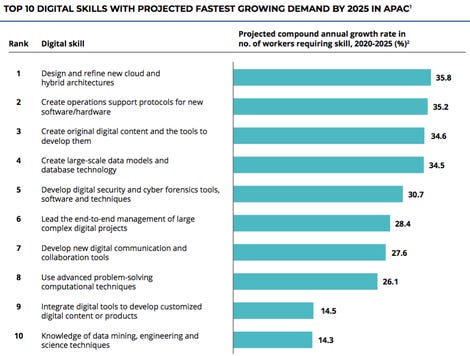Between 666 million and 819 million workers in Asia-Pacific will use digital skills by 2025, up from just 149 million today, with the average employee requiring seven new digital skills to keep up with emerging technologies. Businesses then are likely to face severe talent shortage, particularly in data, cloud, and cybersecurity, if they do little to build out these capabilities.
Singapore, for one, would require 1.2 million digital workers by 2025, up 55% from 2020, including non-digital workers who would need to reskill and new entrants to the workforce, according to commissioned research from Amazon Web Services (AWS), which surveyed 500 digital workers in the country. The report polled 3,196 respondents across six Asia-Pacific markets including Australia, South Korea, India, Japan, and Indonesia.
By 2025, the region’s workers would require 6.8 billion digital skills to carry out their job, up from 1 billion today. This was estimated to require 5.7 billion digital skill trainings over the next five years to ensure the average worker acquired capabilities needed to keep pace with technological advancements. The document referred such trainings as what would be needed to skill one worker from the proficiency level today to the relevant level required in 2025.
In Singapore, this figured clocked at 23.8 million digital skill trainings needed for the local workforce through to 2025, which would enable the country to plug a 35% gap of such trainings recommended for workers who currently did not possess digital skills or were not in the workforce.
Australia had the highest proportion of employees using digital skills today, at 64%, followed by Singapore at 63% and South Korea at 62%. Japan weighed in at 58%, compared to Indonesia’s 19% and India at 12%.
Singapore, however, led the pack with the highest proportion of workers — at 22% — who were using advanced digital skillsets, such as cloud architecture design, followed by South Korea at 21% and Australia at 20%.
Demand for skills types differed by market, with Indonesia and South Korea, for instance, likely to see the fastest growing demand for advanced digital content creation skills, such as ability to create customised digital content including web applications. Japan, in comparison, was expected to see the highest demand jump at 30% for advanced cloud skills, such as migrating organisations’ legacy on-premise environment to cloud-based architectures.
Across the region, in 2025, the report indicated that organisations were likely to challenged by particularly severe skills scarcity in data, cloud, and cybersecurity if they did little to beef up capabilities in these segments.
For instance, the ability to develop digital security and cyber forensics tools and techniques was projected to be in “severe shortage” by 2025. In fact, 30% of digital workers in Singapore and 48% in India pointed to such skills as necessary to carry out their jobs but that they currently lacked.
According to AWS, decision makers interviewed for the report suggested this was the result of rising adoption of cloud and data analytics in the region. “With many compliance standards for data integrity written before cloud computing technology was established, it is critical businesses have the expertise to translate these existing standards for cloud security,” the report noted.
























